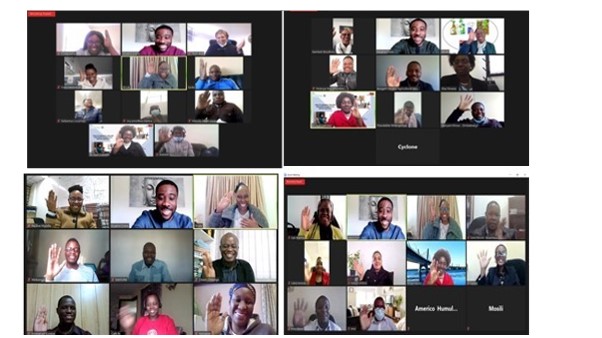CCARDESA Capacitates SADC Member States on Virtual Communications Tools

The advent of COVID-19 has disrupted face to face interaction of many organizations in the SADC region. This realization has made CCARDESA explore ways of engaging its stakeholders virtually. With over 350 million people currently using the Zoom application worldwide, virtual meetings have become the new norm. The sudden increase of Zoom users from 10million in 2019 to a 350million in 2021 attests to the shift from people attending physical meetings to virtual meetings.
CCARDESA undertook an assessment of competency of CCARDESA stakeholder on the use of virtual platforms and organised a training to capacitate them with virtual systems skills for learning and sharing information in the era of COVID-19. Through its online platforms, CCARDESA conducted a survey to assess the competencies of its agricultural stakeholders on the use of virtual systems, e-delivery and decision support tools for learning and sharing information in the era of COVID-19. The results showed that 88% of the people used the Zoom platform, 57% used Microsoft Teams, while 29% used Skype. On competency levels, it was discovered that 52% had average skills, while 12% were advanced, and 32% were at beginner level. CCARDESA also wanted to know their abilities in terms of participation, presentation and hosting virtual meetings. The results revealed that 19% wanted to learn more on how to present during virtual meetings, 23% wanted to know how to host meetings, whereas 44.9% wanted to learn on how to host advanced webinars.
With these results, CCARDESA designed a tailor-made training taking into consideration the identified gaps. The virtual training took place from the 21st -23rd of June 2021. The objective of the training was to familiarize the participants with virtual platforms etiquette, presentations, and advanced webinar hosting skills.
The training was divided into four cohorts and happened over three days, with 4 hours each day and two 4 hours sessions on the last day. Participants learned impactful usage of reactions, breakout rooms, presentations, poll creation and application, background filters, hosting advanced webinars, among other things.
Participants also learned how virtual meetings promote enhanced collaborations and help people have shorter meetings with tighter agendas during the sessions. The teams also shared that virtual meetings are more inclusive as there were no restrictions on who should attend instead of physical meetings where people need to have resources to support travel. Mr Kamlesh Boodhoo from Mauritius indicated that virtual meetings are cost effective because people can have them in the comfort of their homes. He further added that virtual meetings enable participants to pull out of unproductive meetings without significant costs to the participants or the organisers.
Another participant, Ms Mamoholi Mphutlane, mentioned that virtual meetings can be recorded, thereby providing accurate meeting deliberations if one missed a point or two during the meeting. She also indicated that virtual meetings are cost-effective. In addition, virtual meetings allow for a video option that is as good as a physical meeting.
From Mozambique, Ms Elsa Adelia Timana mentioned that virtual meetings allow many people to attend a summit from different geographical locations without travelling, making virtual meetings have a comparative advantage over physical sessions.
The training attracted Forty-two participants( 22 Male and 20 Female) from Angola, Botswana, the Democratic Republic of Congo, Kingdom of Eswatini, Kingdom of Lesotho, Mozambique, Malawi, Mauritius, Madagascar, South Africa, Tanzania and Zambia. The feedback indicated that participants expectations were met and they left the meeting feeling more confident and comfortable to use virtual systems.
However, one unanswered question remained on the participant's minds, as to whether virtual meetings will replace physical meetings after the COVID-19 pandemic has dissipated.
This initiative was supported by the German Federal Ministry of Cooperation and Development (BMZ) through the Programme on Adaptation to Climate Change in Rural Areas in Southern Africa (ACCRA) which CCARDESA is co-implementing with the German Corporation for International Cooperation (Deutsche Gesellschaft für Internationale Zusammenarbeit (GIZ). This training was done to mitigate the effect of COVID-19 on the agricultural sector in the SADC region.
























































